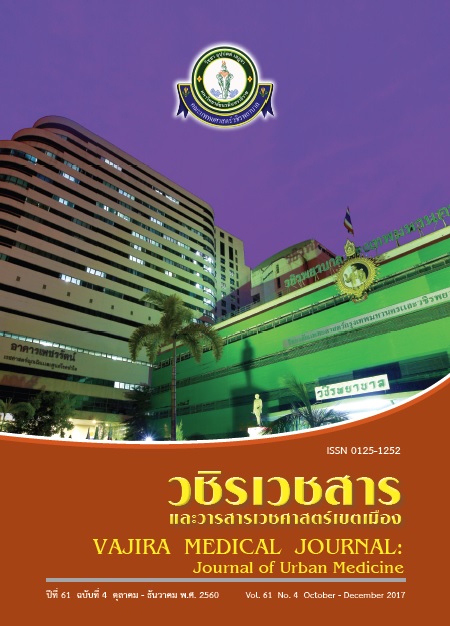Attitude of Government Officer towards the Good Governance of Civil Servant Medical Benefits and Service System and Options of Other Reimbursement Systems
Main Article Content
Abstract
Objectives: To evaluate government officers’ attitudes towards the service under the Civil Servant Medical Benefits system and its good governance. Reimbursement system options, which the officers agreed with, were also studied.
Methods: This was a survey study by a self-administered questionnaire to assess the attitudes of government officers in Bangkok and regional provinces about the current health service and reimbursement system as well as its good governance. Models of other reimbursement systems were contemplated and assessed for the officers’ opinion. Factors associated with the attitudes and the models they selected were also studied.
Results: A total 646 officers participated in the study. Approximately 75% worked in Bangkok. Mean age was 44.7± 8.99 years. Duration of service ranged from 1-40 years (median 20 years). Approximately 29% of the officers and 39% of their members had at least 1 or more medical illnesses. Almost all (95.7) had experience in the process of reimbursement via the Civil Servant Medical Benefits system. Overall, the officers had favorable attitudes towards the reimbursement process, especially those who were aged over 40 years, married, and had never had negative experiences with the process. The officers also had good attitudes towards the good governance of the system. Nevertheless, there were many negative comments about the process of compensation and quality of service in public health sectors along with their expectations, as well as negative scores in some aspects of good governance. The medical benefits model with the highest percentage of agreement (67.8%) was the current system. The second model of preference (24.1%) was a model where the government transferred half of the budget to a private medical insurance provider and the other half to officers as a back-up budget for health promotion or co-payment fee for certain items.
Conclusion: Most officers still had positive attitudes towards the current medical benefits reimbursement and service system as well as its good governance. The majority agreed to carry on with the system. Nevertheless, there were many problems and negative comments towards the current system and few about good governance. The government and the relevant sectors should improve the compensation process and service system to the expectation of the officers. An exploratory study for a new system before a thorough consultation with officers may be considered as an option. These aim to balance the expenses and budget allocated for health care.
Downloads
Article Details
References
2. สอบดี ดอทเน็ต. สวัสดิการข้าราชการและประโยชน์เกื้อกูลข้าราชการ. [อินเตอร์เน็ต]. 2557 [เข้าถึงเมื่อวันที่ 16 พฤษภาคม 2560]. เข้าถึงได้จาก http://www.sorbdee.net/form_show_allnews.php?idsara=632.
3. กมล ชวาลวิทย์. คลังเตรียมจัดแพ็คเกจคุมเบิกค่ารักษา “ข้าราชการ” ดึงบริษัทประกันบริหารงบ 6 หมื่นล้าน-ยันไม่กระทบสิทธิเดิม. ไทยพับลิก้า. [อินเตอร์เน็ต]. 2559. [เข้าถึงเมื่อวันที่ 11 ธันวาคม 2559]. เข้าถึงได้จาก http://thaipublica.org/2016/09/medicalwelfareofficials1/.
4. กมล ชวาลวิทย์. โครงสร้างประชากร 30 ปีข้างหน้า. ไทยพับลิก้า. [อินเตอร์เน็ต]. 2557. [เข้าถึงเมื่อวันที่ 11 ธันวาคม 2559]. เข้าถึงได้จาก http://thaipublica.org/2014/04/population-structure-5/.
5. คลังรื้อค่ารักษาพยาบาล ขรก. ซื้อประกันภัยกลุ่ม 10 ล้านคน. ประชาชาติธุรกิจ. [อินเตอร์เน็ต]. 2559. [เข้าถึงเมื่อวันที่ 11 ธันวาคม 2559]. เข้าถึงได้จาก https://www.hfocus.org/content/2016/09/12786.
6. สำนักงานคณะกรรมการกำกับและส่งเสริมการประกอบธุรกิจประกันภัย คปภ. ประกันชีวิต. [อินเตอร์เน็ต]. [เข้าถึงเมื่อวันที่ 16 พฤษภาคม 2560]. เข้าถึงได้จาก http://www1.oic.or.th/th/elearning/inner_life2.php.
7. Schaeffer RL, Mendenhall W, Ott L. Elementary Survey Sampling. 4th ed. Belmont CA: Duxbury Press 1990.
8. Gorsuch RL. Factor Analysis. 2nd ed. Hillsdale NJ: Erlbaum; 1983.
9. Ferketich S. Focus on psychometrics: Aspects of item analysis. Res Nurs Health. 1991;14;165–8.
10. สำนักพัฒนาระบบจำแนกตำแหน่งและค่าตอบแทน; สำนักงาน ก.พ. .กำลังคนภาครัฐในฝ่ายพลเรือน 2558. นนทบุรี: โรงพิมพ์ 21 เซ็นจูรี่; 2559.
11. Ajzen I, Fishbein M. Understanding attitudes and predicting social behavior. Englewood Cliffs NJ:Prentice-Hall; 1980.
12. ปธาน สุวรรณมงคล. การบริหารงานภาครัฐกับการสร้างธรรมาภิบาล. สถาบันพระปกเกล้า: แก่นจันทร์การพิมพ์; 2558.
13. กรมบัญชีกลาง. คู่มือสวัสดิการรักษาพยาบาลข้าราชการ. กรุงเทพฯ: คณะกรรมการสวัสดิการรักษาพยาบาลข้าราชการ; 2551.
14. มติชนออนไลน์. ปี 68 ไทยก้าวเข้าสู่สังคมผู้สูงอายุอย่างสมบูรณ์ [อินเตอร์เน็ต]. 2557 [เข้าถึงเมื่อวันที่ 16 พฤษภาคม 2560]. เข้าถึงได้จาก http://www.thaihealth.or.th/Content/23525-20.html.
15. สมฤดี ธรรมสุรัติ. ปัจจัยคุณภาพบริการที่มีผลต่อการตัดสินใจเลือกใช้บริการและความภักดีต่อตราสินค้าของโรงพยาบาลเอกชน ในเขตกรุงเทพมหานคร [การศึกษาเฉพาะบุคคลปริญญาบริหารธุรกิจมหาบัณฑิต]. กรุงเทพฯ: มหาวิทยาลัยกรุงเทพ; 2554.
16. ศักดิ์ดา ศิริภัทรโสภณ, ปารย์ทิพย์ ธนาภิคุปตานนท์. ความสัมพันธ์ระหว่างคุณภาพการบริการที่ได้รับกับความพึงพอใจและความภักดีของคนไข้: กรณีศึกษาโรงพยาบาลเอกชนในเขตกรุงเทพมหานคร.
17. ประชาชาติธุรกิจ. กรมบัญชีกลาง แจงเกณฑ์รักษา รพ.เอกชนได้แค่ 4 กรณี [อินเตอร์เน็ต]. 2558 [เข้าถึงเมื่อวันที่ 16 พฤษภาคม 2560]. เข้าถึงได้จาก http://www.prachachat.net/news_detail.php?newsid=1437035437.
18. ไทยพับลิก้า. กรมบัญชีกลางคุมเข้มค่ารักษาพยาบาลออกกฎคุมราคายานอก บีบใช้ยาในประเทศ หวั่นอนาคตชีวิตคนไทยไร้คุณภาพ [อินเตอร์เน็ต]. 2557 [เข้าถึงเมื่อวันที่ 16 พฤษภาคม 2560]. เข้าถึงได้จาก http://thaipublica.org/2014/01/measures-tocontrol-medical-costs/.
19. วางนโยบาย รพ.ใช้ยาอย่างสมเหตุสมผล. สำนักงานกองทุนสนับสนุนการสร้างเสริมสุขภาพ. [อินเตอร์เน็ต]. 2559. [เข้าถึงเมื่อวันที่ 16 พฤษภาคม 2560]. เข้าถึงได้จาก http://www.thaihealth.or.th/Content/32036-A5.html.
20. คมชัดลึก. วิกฤติ... ‘รพ.รัฐ!!! สิ่งที่คนไทยช่วยแก้ไขได้ [อินเตอร์เน็ต]. 2559 [เข้าถึงเมื่อวันที่ 16 พฤษภาคม 2560]. เข้าถึงได้จาก http://www.komchadluek.net/news/edu-health/232260.
21. วิรวินท์ ศรีโหมด. โอนสิทธิพยาบาลให้บริษัทประกันความเสี่ยงข้าราชการ 5 ล้านคน. โพสต์ทูเดย์ [อินเตอร์เน็ต]. 2560 [เข้าถึงเมื่อวันที่ 16 พฤษภาคม 2560]. เข้าถึงได้จาก http://www.posttoday.com/analysis/report/468979.


